-
- About Us
- Other Offices
- e-Services
-
Gallery
Photo Gallery
Video Gallery
- Contact
- Map and Road Database
- Comment/Complaint
-
- About Us
-
Other Offices
Subordinate offices
Higher Offices
- e-Services
-
Gallery
Photo Gallery
Video Gallery
-
Contact
Official Contact
Contact Map
- Map and Road Database
- Comment/Complaint
At the beginning LGED was involved in the rural infrastructure development but later the activities of the department expanded at a faster pace. LGED performs its functions through three sectors- Rural, Urban and Small Scale Water Resources for creating local level infrastructural facilities thus contributing towards the goal of attaining economic growth. LGED as an agency also extends technical assistance to the Local Government Institutions (LGIs) while its project implementation leaves a positive impact in the overall progress of the country including the socio-economic development, employment generation and poverty alleviation.
Rural Development:
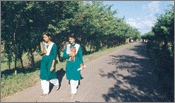 |
LGED is a national and internationally acclaimed world class engineering department in the field of rural infrastructure development. A study conducted by World Bank in 2016 states that most of the people living in remote rural areas have access to metaled road within two kilometers which are connected to highways. The achievement has been mentioned as an instance for developing countries. |
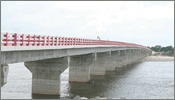 |
Growth centres and rural markets are being developed to infuse dynamism in village economy, trade and commerce. The facilities in place have enabled the farmers in the transportation of agricultural produces to local markets and in ensuring fair prices. Enhanced income and creation of employment opportunities have left a positive impact in poverty alleviation. |
LGED is also constructing Upazila Complex Buildings and it’s expansion as well as Union Parishad buildings so that the local people can have access to services from local government institutions under one roof. These rural infrastructures have facilitated in attaining the country’s goal of graduating to the level of developing nations.
Bangladesh is gifted with a vast coastal belt along the Bay of Bengal. The zone is periodically lashed by cyclonic storm and tidal surge. LGED builds multipurpose cyclone shelters to save lives and properties of the coastal people from natural disasters. These cyclone shelters are also used as primary schools thus contributing to the expansion of education. Shelter connecting roads are also constructed for easy access to the shelters during natural disasters. The shelters are fitted with necessary amenities including safe drinking water, separate toilets for men and women, solar power, room for expecting mothers and new born as well as arrangements for keeping cattle heads at the shelter during natural disaster.
Urban infrastructure development program:
|
Bangladesh is experiencing a major rural to urban migration. Importance of cities and towns is ever increasing in the national development in view of fast urbanisation. Of the country’s total population, 28 percent lives in urban areas and the contribution of cities and towns in GDP is more that 60 percent. Unplanned urbanization creates adverse impact on social and natural environment. Service delivery for the growing urban population like housing, water and sanitation, waste management, education, health, transportation etc. are major challenges. To address these challenges, LGED is extending assistance to municipalities and city corporations through various projects for the betterment of service delivery. These include formulation of master plans for municipalities, governance improvement and capacity development besides improvement of physical infrastructures of the townships. |
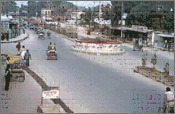 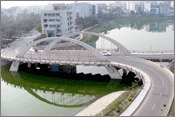 |
Small scale water resources development program:
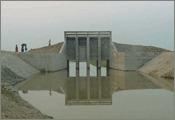 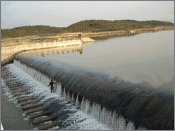 |
Bangladesh being an agrarian country is endowed with many rivers and water resources. Since 80s of the last millennium, LGED initiated several schemes of small scale water resources under the rural development projects with the objective to augment agricultural production using surface water. Subsequently the first small scale water resources development project was undertaken in the middle of 90s. Later, LGED started implementing small scale water resources development projects across the country with the participation of stakeholders in line with National Water Policy (NWP) of 1999 and the National Water Management Plan (NWMP) adopted in 2001 whereby LGED was given the responsibility of working in the command area upto 1000 hacraes. |
|
Activities like irrigation, pisciculture as well constructing embankment for protecting crop from floods are carried out under the small scale water resources projects. Earthen mounds (Killa) are also built for protection of harvested crops from floods. The small scale water resources projects implemented with participation of local people accelerated the pace of poverty reduction efforts of the government and above all the food autarky achieved in the country. |
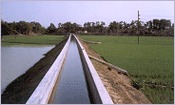 |
LGED’s involvement with other ministries:
LGED is also involved in the implementation of infrastructure development work of other ministries side by side implementing it’s own projects. Notably, the Primary School and Primary Training Centres (PTI) build across the country by LGED under the Ministry of Primary and Mass Education is contributing to ensuring quality education and attaining one hundred percent enrollment in the school. PTIs are engaged in further upgradation of educational standard.
Upazila Freedom Fighters Complex Building Construction Project of the Ministry of Liberation War Affairs is also implemented by LGED. “Bir Nibash” (house of hero), a house building project for insolvent freedom fighters are being constructed so that the valiant sons of the soil can live with dignity and honour.
Besides, a number of projects undertaken by Ministry of Agriculture, Environment and Forest, Land and Chattogram Hilltracts Affairs are being implemented by LGED.
Conclusion:
LGED follows the guidelines related to environment and social safety, innovation and gender equality while undertaking its activities. LGED is implementing integrated programmes to realise the objectives of government’s Seventh Five Year Plan, Vision-2021 and attain the Sustainable Development Goals (SDG) of the United Nations. With these coordinated efforts, Bangladesh will march head towards becoming a developed nation soon.
Major Functions of LGED:
Rural Infrastructure:
|
Urban Infrastructure:
|
Small Scale Water Resource Development:
|
| LGED Achievements in last 10 Years (2009-2018) |
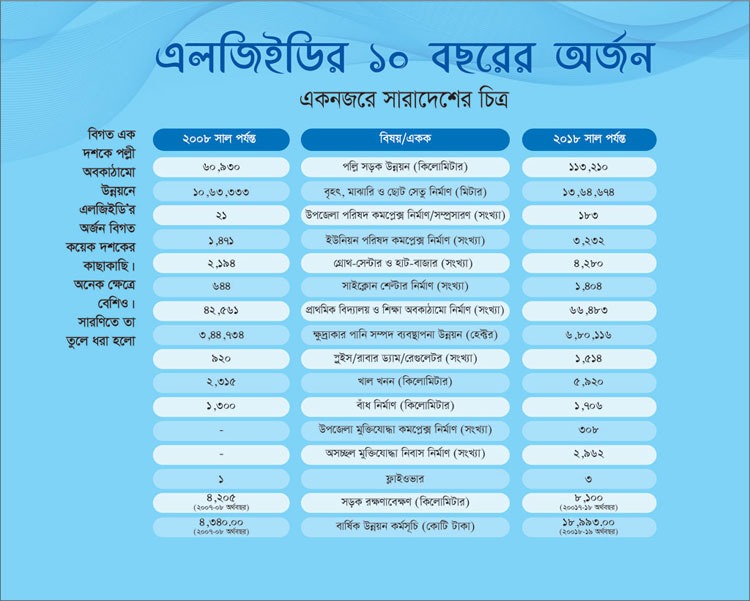
Planning and Implementation: Cabinet Division, A2I, BCC, DoICT and BASIS



















